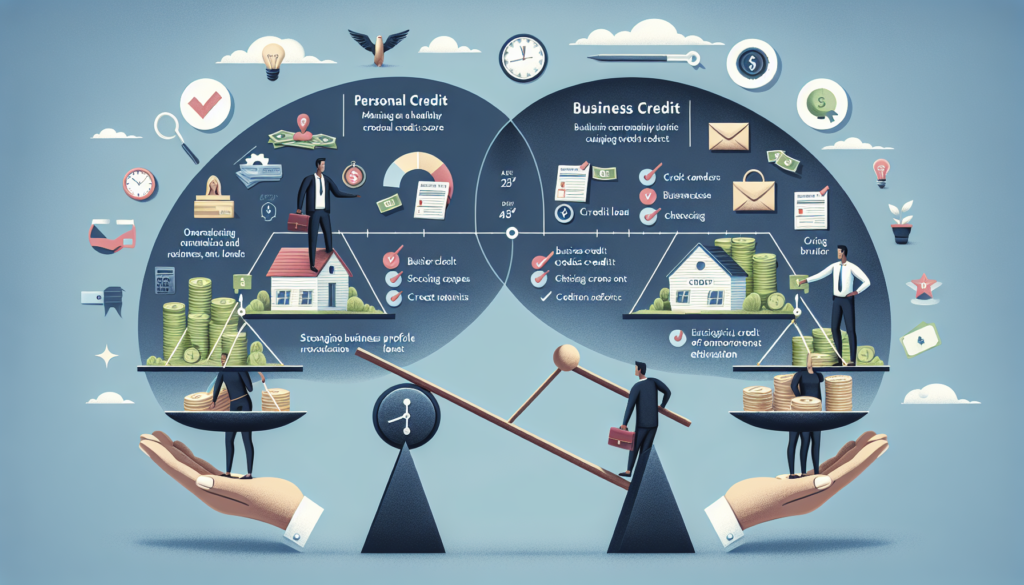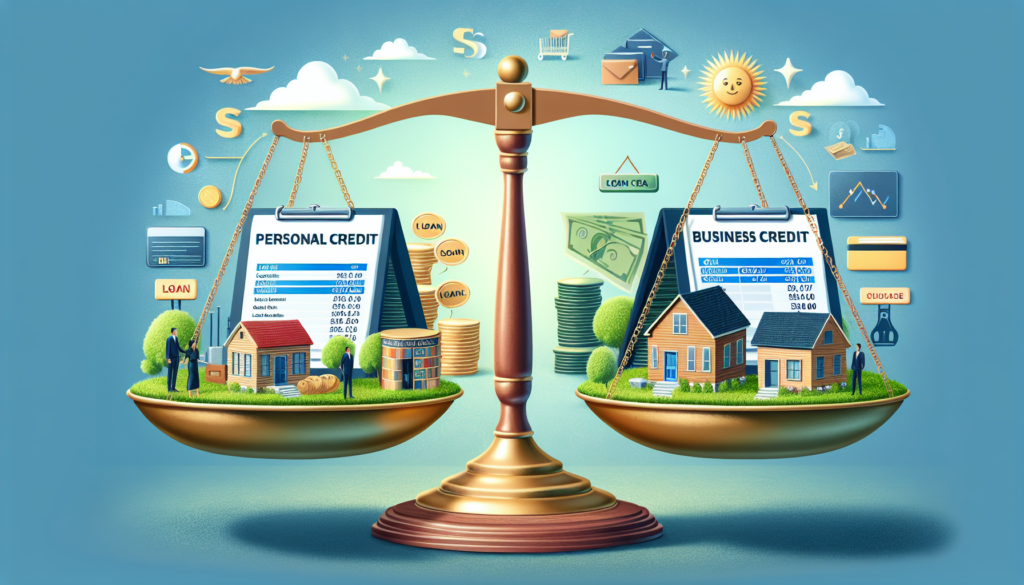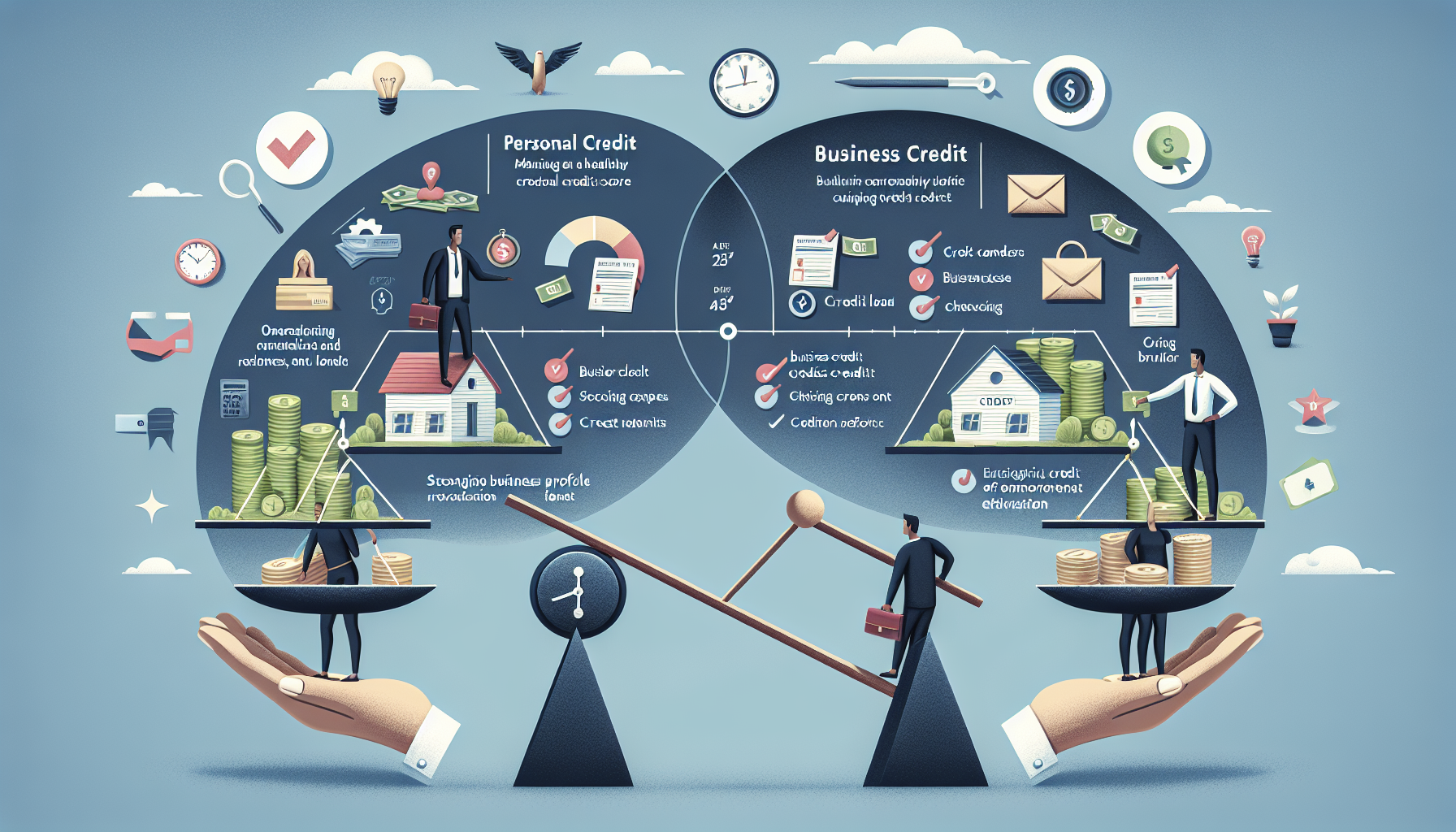Discover how your personal credit can significantly impact your business credit. In this article, we will explore the intricate connection between your personal and business credit, unveiling why it’s essential to maintain a healthy personal credit score for the success and growth of your business. From securing loans and credit lines to attracting potential clients and partners, understanding the role of your personal credit will empower you with the knowledge and strategies to take control of your business’s financial future. So, let’s delve into the fascinating world of credit and unlock the key to your business’s prosperity.

Understanding Personal Credit
Definition
Personal credit refers to an individual’s financial reputation and creditworthiness. It is a measure of an individual’s ability to manage credit responsibly and repay loans. Personal credit is often represented by a credit score, which is a numerical value assigned to individuals based on their credit history and financial behavior.
Factors Affecting Personal Credit
Several factors impact personal credit. These include credit history, payment history, amounts owed, length of credit history, and the types of credit used. Your credit history reflects your borrowing and repayment activities, while your payment history reveals how consistently you make payments on time. The amounts you owe and the types of credit you use also contribute to your creditworthiness.
Importance of Personal Credit
Your personal credit plays a significant role in your financial life. It affects your ability to obtain loans, credit cards, mortgages, and other forms of credit. A strong personal credit allows you to access favorable interest rates and favorable terms. Additionally, personal credit is used by landlords, employers, and insurance companies to evaluate your reliability and trustworthiness.
Understanding Business Credit
Definition
Business credit refers to the financial reputation and creditworthiness of a business entity. It is similar to personal credit but focuses on a company’s borrowing and repayment activities. Business credit is often represented by a credit score specific to the company, indicating its financial stability and ability to fulfill its financial obligations.
Factors Affecting Business Credit
Several factors affect business credit, including payment history, outstanding debts, length of credit history, and public records. The payment history of a business, including timely payments to vendors and lenders, contributes significantly to its creditworthiness. The outstanding debts and credit utilization ratio also impact business credit. The length of credit history and any public records, such as bankruptcies or judgments, can further influence business credit.
Importance of Business Credit
Business credit is crucial for companies of all sizes and stages. It enables businesses to access financing, secure favorable terms with vendors, and build a trustworthy reputation in the market. A strong business credit profile can open doors to business expansion, attract investors, and increase the potential for future growth.
Link Between Personal and Business Credit
Interconnectedness
There is a strong connection between personal and business credit. While they serve different purposes, personal credit can significantly impact a business’s ability to establish and maintain good business credit.
Shared Factors
Personal credit and business credit share common factors. For example, both depend on payment history, outstanding debts, and credit utilization. If you have a solid personal credit history, this can positively influence the perception of your business’s creditworthiness.
Importance of Personal Credit for Business Credit
Personal credit plays a crucial role in establishing business credit for smaller businesses or startups that may not have an extensive credit history. Lenders and financial institutions often rely on the personal credit of small business owners when assessing the creditworthiness of their businesses. A strong personal credit history can increase the chances of obtaining business credit or loans and can also help secure better terms and interest rates.

Building Personal Credit for Business Purposes
Establishing a Solid Personal Credit History
To build a solid personal credit history, start by paying bills and debts on time. Make sure to use credit responsibly and keep credit card balances low. It is important to establish a diverse credit mix, such as having a credit card, a car loan, or a mortgage. Avoid opening too many new accounts at once as this can negatively impact credit score.
Maintaining a Good Personal Credit Score
Maintaining a good personal credit score requires consistent financial responsibility. This includes paying bills on time, keeping credit utilization low, and regularly checking credit reports for accuracy. Address any errors promptly and take steps to improve credit if needed, such as reducing debts or seeking credit counseling.
Utilizing Personal Credit for Business Financing
When starting a business, personal credit can be used to access financing options such as personal loans, home equity loans, or personal lines of credit. By utilizing personal credit responsibly for business financing, you can establish a positive credit history for your business.
Implications of Personal Credit on Business Creditworthiness
Lending Institutions’ Perspective
Lending institutions consider personal credit as an indicator of an individual’s financial responsibility and behavior. A positive personal credit history shows a higher likelihood of responsible business financial management, making businesses more attractive to lenders.
Potential Impact on Business Loan Applications
In most cases, business loan applications require personal guarantees or collateral from the business owner. Lenders assess the personal credit of the business owner to evaluate the risk and creditworthiness of the business. A strong personal credit score increases the likelihood of loan approval and may result in more favorable loan terms and interest rates.
Effects on Interest Rates and Terms
A solid personal credit history can positively impact the interest rates and terms offered by lenders for business loans. Lenders are more likely to offer lower interest rates and more favorable terms to individuals with good personal credit, as it reflects their ability to manage credit responsibly. This can ultimately save your business money and contribute to its financial success.
Separating Personal and Business Finances
Establishing Separate Business Entities
To separate personal and business finances, consider establishing a legal business entity such as a limited liability company (LLC) or a corporation. This helps create a distinction between personal and business finances, protecting personal assets in case of business liabilities.
Opening Business Bank Accounts
Opening a dedicated business bank account is essential for maintaining separate finances. It allows for clear separation of personal and business expenses, simplifies accounting, and provides a transparent record of business transactions.
Developing Independent Business Credit Profiles
To further separate personal and business finances, it is important to develop an independent business credit profile. This involves obtaining an Employer Identification Number (EIN) from the IRS, registering the business with credit bureaus, and establishing credit relationships with vendors and suppliers.
Using Personal Credit as a Starting Point for Business Credit
Initial Financing Options
In the early stages of a business, personal credit often serves as a starting point for obtaining financing. Personal loans, credit cards, or lines of credit can be used to fund initial business expenses, invest in necessary equipment, or cover operational costs.
Using Personal Guarantees
When applying for business credit or loans, personal guarantees may be required. This means that as the business owner, you are personally liable for the debt if the business cannot repay it. A strong personal credit history increases the chances of obtaining credit through personal guarantees.
Gradually Transitioning to Solely Business Credit
Over time, as the business establishes a solid credit history, it becomes possible to transition to solely relying on business credit. This can be achieved by consistently making on-time payments, managing debt responsibly, and diversifying credit relationships with different lenders and vendors.
Improving Business Credit Independently
Building a Positive Business Credit History
Building a positive business credit history involves consistently making payments on time, minimizing outstanding debts, and managing credit utilization wisely. It is important to establish a solid track record of reliable financial behavior, as this will enhance the business’s creditworthiness.
Making Timely Payments and Managing Debt
Timely payments to vendors, suppliers, and lenders are crucial for maintaining good business credit. Avoid late payments and communicate with creditors if there are any challenges. Additionally, managing and paying off business debt responsibly will strengthen the business’s credit profile.
Diversifying Credit Relationships
Establishing relationships with multiple vendors, suppliers, and lenders can diversify the business’s credit profile. This demonstrates a wide range of credit sources, and if managed well, it can contribute positively to the business’s creditworthiness.
Monitoring and Protecting Both Personal and Business Credit
Regularly Checking Credit Reports
Regularly checking both personal and business credit reports is essential for monitoring credit statuses and detecting any inaccuracies or fraudulent activities. By being proactive, you can quickly address any issues and maintain the accuracy of your credit profiles.
Guarding Against Identity Theft and Fraud
Protecting personal and business information is crucial in guarding against identity theft and fraud. Utilize secure and encrypted systems, regularly update passwords, and avoid sharing sensitive information unnecessarily.
Resolving Errors or Inaccuracies
If you notice any errors or inaccuracies in your personal or business credit reports, it is important to take immediate action to resolve them. Contact the credit reporting agencies and relevant creditors to address the issues and ensure accurate reporting.
Conclusion
Understanding the connection between personal and business credit is essential for individuals looking to establish or grow their businesses. Personal credit serves as a foundation for building business credit, impacting loan approvals, interest rates, and terms. By maintaining a solid personal credit history, separating personal and business finances, and strategically utilizing personal credit as a starting point, individuals can establish strong business credit profiles. It is crucial to monitor and protect both personal and business credit, ensuring accuracy and safeguarding against identity theft or fraud. With a comprehensive understanding of personal and business credit and the proactive steps to build and maintain them, individuals can enhance their overall financial success and position their businesses for growth and prosperity.

